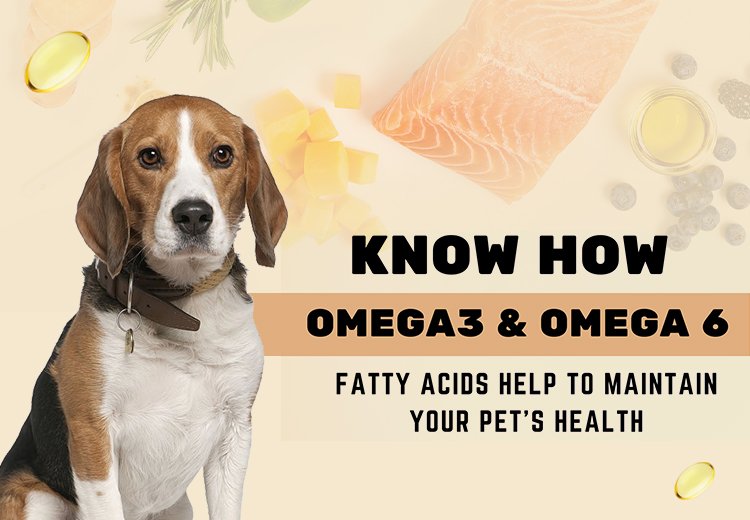Jul 17, 2023

Fats are a potent energy source and form a significant component of your pet’s diet. The fatty acids are the building blocks of fats and are crucial for creating a balanced diet for your pet’s health and overall well-being. Some fatty acids should be essentially included in your pet’s diet as they are not naturally produced in your pet’s body.
Two such well-known fatty acids - Omega-3 fatty acid and Omega-6 fatty acid are among your pet’s essential nutrients. These fatty acids are commonly known as polyunsaturated fats or PUFA. These fatty acids are required for vital bodily functions and should be included in the right quantity and ratio for your pets’ health.
Omega-3 and Omega-6 essential fatty acids perform a crucial role in cell membrane structure, the immune system, and blood circulatory system. They also support normal physiologic and cell functions in your pet.
Now that we have learned about the importance of fatty acids for your pet’s health, let us understand in detail both Omega-3 and Omega – 6 fatty acids and why it is vital to include them in your pet’s food.
Pets require Omega-3 fatty acids during their entire lifespan, especially during gestation and early development stages. Omega-3 is available in many food sources like meats and fish. It is primarily found in plant oils and animal fats.
ALA, EPA and DHA are essential fatty acids for growing and adult pets. Hence, it is highly recommended to feed dietary sources of all three types of omega-3 fatty acids for the optimal health of your pet. Particularly, DHA is vital for young, growing pets for their brain and immune system development, along with better eye functions.
Omega-3 fatty acids are great for your pet's body and central nervous system tissues. They have anti-inflammatory properties that helps reduce swelling and are useful in hydrating dry skin and your pet’s healthy skin and coat. Omega-3 also benefits in relieving itchy skin, heart and kidney health, cognitive function and promoting healthy joints in pets.
Omega-6 fatty acids are pro-inflammatory which means they may increase swelling in wounds and injuries. These fatty acids manage many bodily processes like reproduction and provide energy for all daily physical activities. The key sources of Omega – 6 are meat, poultry and fish.
Omega-6 plays a key role in maintaining your pet's skin health by protecting their skin's outermost water barrier layer. Many essential molecules in the body are made using linoleic acid. Hence, Omega – 6 supports the body’s repair system, helps in restoring skeletal and muscle tissue and in maintaining a healthy metabolism.
Both Omega-3 and Omega–6 are essential for your pet’s healthy growth and development. Specially, Omega-3 is necessary for young and growing pets, while Omega – 6 is required for pets of all ages. Therefore, it is vital to include an appropriate amount of these polyunsaturated fatty acids in your pet’s diet.
Both omega-3 and omega-6 fatty acids are involved in the inflammatory processes of the body. Omega-3 fatty acids have anti-inflammatory properties to reduce swelling and inflammation, while Omega-6 fatty acids are on a higher tendency to be pro-inflammatory, which means it may cause swelling in the body. For this particular reason, it is crucial to maintain an appropriate balance of Omega-3 to Omega-6 fatty acids. If omega-6 is consumed more than omega-3 fatty acids, this will create a low-grade inflammatory state that may lead to many serious diseases like cancer, diabetes and obesity.
While it is essential to give your pet an omega-3 and Omega-6-rich diet, subsequently it is also important to ensure you provide the correct ratio between the two. A research suggested that the required ratio of 30:1 omega-6 to omega-3 is necessary to maintain the balance. Luckily, many commercial pet foods come with this correct ratio of fatty acids for pets; still, some are likely to be higher in omega-6 compared to low omega-3 content.
An imbalance in the ratio of these fatty acids can potentially cause serious health problems for your pet. Consult your veterinarian to ensure your pet’s diet has the correct Omega-3 to Omega-6 ratio, and discuss adding a fish oil supplement for your pet or consider switching your pet food brand to maintain the right balance.
Mar 07, 2025